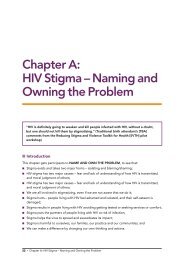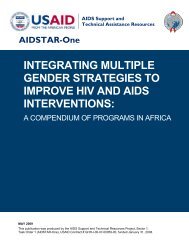Guide for Community Assessments on Women's Health Care - ICRW
Guide for Community Assessments on Women's Health Care - ICRW
Guide for Community Assessments on Women's Health Care - ICRW
You also want an ePaper? Increase the reach of your titles
YUMPU automatically turns print PDFs into web optimized ePapers that Google loves.
Why was this <str<strong>on</strong>g>Guide</str<strong>on</strong>g> developed?<br />
In 2006 the Parliamentarians <str<strong>on</strong>g>for</str<strong>on</strong>g> Women’s <strong>Health</strong> project, in partnership with the parliamentarians,<br />
HIV-positive women and civil society organizati<strong>on</strong>s, organized community assessments in Kenya<br />
and Namibia to gather grassroots in<str<strong>on</strong>g>for</str<strong>on</strong>g>mati<strong>on</strong> and develop analysis <strong>on</strong> women’s health care to<br />
support the related initiatives of MPs. The assessments c<strong>on</strong>sisted of several <strong>on</strong>e-day workshops with<br />
different stakeholder groups, including HIV-positive women, n<strong>on</strong>-positive women, service providers<br />
and community leaders, and gauged their opini<strong>on</strong>s <strong>on</strong> women’s priority health c<strong>on</strong>cerns, the gaps<br />
between needs and service delivery, and barriers to women’s health care.<br />
This activity was successful and produced a number of important results. It created:<br />
●●<br />
●●<br />
●●<br />
●●<br />
An opportunity <str<strong>on</strong>g>for</str<strong>on</strong>g> MPs to develop firsthand knowledge about the problems women face in<br />
accessing health care, including specific problems <str<strong>on</strong>g>for</str<strong>on</strong>g> women with HIV.<br />
An opportunity <str<strong>on</strong>g>for</str<strong>on</strong>g> women to learn more about health issues, including the importance of<br />
simple but potentially life-saving preventi<strong>on</strong> measures, such as an annual pap smear.<br />
A plat<str<strong>on</strong>g>for</str<strong>on</strong>g>m <str<strong>on</strong>g>for</str<strong>on</strong>g> rural women to raise their c<strong>on</strong>cerns with MPs and be listened to, so they could<br />
bring their voices and analysis to the nati<strong>on</strong>al health care resp<strong>on</strong>se.<br />
A new relati<strong>on</strong>ship between the MPs and rural women. As a result of the community<br />
assessment process, the women began to see MPs as an advocate <str<strong>on</strong>g>for</str<strong>on</strong>g> their issues.<br />
● ● A vehicle <str<strong>on</strong>g>for</str<strong>on</strong>g> empowerment, strengthening the awareness, self-esteem and organizati<strong>on</strong>al<br />
strength of rural women, particularly women with HIV.<br />
● ● A dialogue and mutual process of learning between HIV-positive women and MPs to <str<strong>on</strong>g>for</str<strong>on</strong>g>ge an<br />
<strong>on</strong>going relati<strong>on</strong>ship of joint advocacy and acti<strong>on</strong>.<br />
● ● The <str<strong>on</strong>g>for</str<strong>on</strong>g>mati<strong>on</strong> of a working group of HIV-positive women who m<strong>on</strong>itor health services and<br />
work closely with MPs to lobby <str<strong>on</strong>g>for</str<strong>on</strong>g> ways to improve health services.<br />
●●<br />
A number of MP initiatives to establish new parliamentary committees and develop new<br />
policies to address women’s issues.<br />
● ● A number of community initiatives by the participants to plan and implement local acti<strong>on</strong>s <str<strong>on</strong>g>for</str<strong>on</strong>g><br />
change to improve women’s health care.<br />
●●<br />
A methodology to collect data and analysis in other regi<strong>on</strong>s and <strong>on</strong> other topics (e.g.,<br />
educati<strong>on</strong>). MPs currently are using this methodology in their work.<br />
Given the success of the community assessment process, project staff sought to share its<br />
methodology and experience with MPs and organizati<strong>on</strong>s in other countries, with the hope that they<br />
might initiate similar community assessments <strong>on</strong> women’s health issues.<br />
Who is the <str<strong>on</strong>g>Guide</str<strong>on</strong>g> <str<strong>on</strong>g>for</str<strong>on</strong>g>?<br />
The guide is <str<strong>on</strong>g>for</str<strong>on</strong>g> individuals and organizati<strong>on</strong>s that are working to improve women’s health care. This<br />
group includes parliamentarians and organizati<strong>on</strong>s of people living with HIV, and those who are<br />
working <strong>on</strong> health and HIV/AIDS issues, women’s rights and human rights.<br />
How can the <str<strong>on</strong>g>Guide</str<strong>on</strong>g> be used?<br />
This guide will help you plan and implement a participatory process to assess women’s health needs<br />
and c<strong>on</strong>cerns at the community level. You can do this <strong>on</strong> a collaborative basis, working with HIVpositive<br />
women, civil society organizati<strong>on</strong>s and MPs. Chapter B shows you how to plan the process,<br />
and Chapter C details how to run the community workshops.<br />
10 Chapter A: Introducti<strong>on</strong>

















